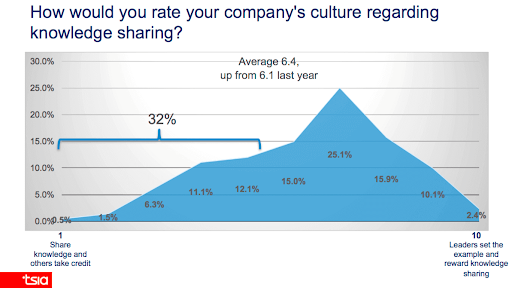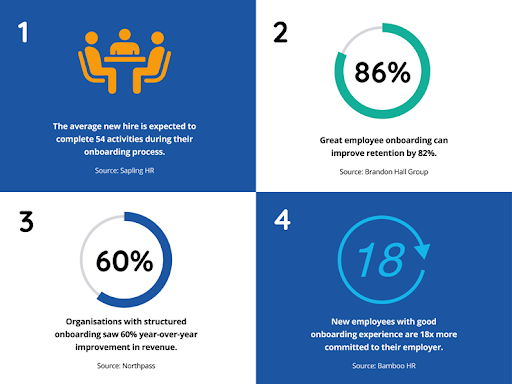
In the information-intensive business world, the one thing that can give you a competitive edge is – knowledge.
When leveraged right, knowledge has the power to spark innovation, boost collaboration, and achieve peak productivity levels.
However, most organizations today face the daunting challenge of scattered information and knowledge hoarding. These are the silent problems that can end up spoiling a company’s work culture.
Creating a systematic knowledge sharing system can bring some relief. Constant knowledge sharing takes workforce efficiency to a whole new level and gets the creative juices flowing across teams.
In this blog, we will learn about knowledge sharing in detail, explore the benefits it brings to the table, go through some useful tips to foster knowledge sharing culture, and a lot more.
Let’s go!
What Is a Knowledge Sharing System?
A knowledge sharing system facilitates information exchange between employees on a centralized platform. Employees can share their insights, experiences, and observations, which helps create a knowledge base with rich information and resource that is easy to access and use. With employees coming together to share their valuable knowledge and nuggets of wisdom, collaboration improves, productivity shoots up, and creativity flourishes.
The Side Effects of Knowledge Hoarding
Knowledge hoarding happens when employees willingly keep their hard-earned, business-critical information to themselves. Such employees feel their exclusive knowledge keeps them in a position of power where no one can challenge their decisions.
While knowledge hoarding might bring short-term benefits to some employees, in the long run, it can be detrimental to your organization.
With no access to useful department-specific information, new hires will have a tough time getting up to speed. Employees might end up making mistakes that can cost a bomb, thus affecting your company’s bottom line. Knowledge hoarding also results in misaligned teams who have trouble working together due to a lack of transparency.
Another reason knowledge hoarding should be avoided at all costs is how terribly it can impact employee engagement. When experience-based knowledge is exclusively held by a few individuals, it gets challenging for employees to get the information they need to do their jobs. They will not be as engaged in their work as they should be, which hurts their productivity and performance.
Key Benefits of Knowledge Sharing
There is a lot you can gain by adopting knowledge sharing at your workplace. An environment that allows seamless sharing of knowledge fosters creativity and innovation and lets employees be their productive best.
Let’s dive into these benefits in detail below:
Boosts Employee Productivity & Performance
Most of the time, employees end up spending more time searching for information than doing what really matters. This is a productivity killer as a significant part of their workdays is wasted on trivialities. A knowledge sharing system saves employees from all the to and fro of searching for information as everything they need is right at their fingertips. They can complete tasks without friction and put their best foot forward every day at work.
Ignite Innovation in Teams
Innovation is critical if you want to witness transformational growth. With a knowledge sharing platform, employees get the opportunity to bring forth their unique insights and ideas to the table. As all the creative juices flow together on a single platform, employees can be more innovative with even the most ordinary tasks and come up with creative solutions to common problems.
Preserve Valuable Business Knowledge
When seasoned employees retire or resign, the insights they gain during their tenure also go out the door. Although you can fill up their positions, you can never go into the brains of those employees and access the nuggets of wisdom they accumulated over the years. Building a knowledge sharing culture helps you preserve the expertise of veteran employees so teams can perform well even in their absence.
Did you know?
Nearly one-third of companies rate their knowledge sharing culture as five or below on a scale of 10!

Aids Employee Onboarding
There is an overwhelming amount of things to learn and work to do for new hires the moment they join. At this time, easy access to your company’s best practices and expert insights can work like a miracle and help them understand the work faster. Knowledge-sharing culture ensures that new employees have all the information they need to perform tasks and learn the ropes of the new role.
Read More: Employee Onboarding: How to Use Your Knowledge Base Effectively
Did you know?

Common Challenges in the Knowledge Sharing Process
The simple process of knowledge sharing can be hard to implement if you are unprepared for the challenges it brings along. Let’s look at some of these challenges so you can take timely actions and execute the process successfully.
Lack of Employee Support
Employees are at the center of knowledge sharing. Despite that, getting buy-in from your workforce for implementing a knowledge sharing system can be the most daunting task. No doubt, you want the best for employees. But employees will still have inhibitions in breaking old habits and accepting something new. They will need a lot of convincing around why knowledge sharing platforms are the need of the hour and what benefits they can bring to the table.
Inadequate Tools
Without the support of the right technology, knowledge sharing initiatives can go off-track. Often, organizations fail to incorporate appropriate tools that end up complicating the process instead of simplifying it. This often leads to a lack of participation from employees as they prefer doing things the traditional, easy way than using a knowledge sharing tool that doesn’t look promising.
Lack of Maintenance
A knowledge-sharing system can get obsolete soon if it’s not regularly maintained. Outdated information will do more harm than good as it directly impacts the quality of the decisions employees make at work. The tasks will be hampered, and employees will have no choice but to resort to the same old routes of emails and calls to get the information they need.
Reluctance to Share Knowledge
The fear of losing competitive advantage looms large on employees, and therefore they are reluctant to share their valuable knowledge with others. Employees are usually worried that if they divulge everything that they know, a company might not need them. For them, knowledge hoarding is a way to maintain their competitive edge and become indispensable in the workplace.
If not tackled on time, these challenges in knowledge sharing might amplify, and all your hard work will go down the drain. Now that you are aware of the possible hindrances, you can take timely actions and build a successful process.
How to Encourage Knowledge Sharing in Your Workplace
Knowledge sharing should be a top priority for every organization that wants to survive and succeed in the current competitive climate. However, the journey to build a flawless knowledge sharing process is not a bed of roses. Like everything, this process comes with its share of challenges that can prove problematic.
Well, we have good news for you. Here are some easy peasy ways you can adopt to facilitate knowledge sharing at work and experience transformational changes.
Build a Culture That Keeps Knowledge Sharing Front & Center
How frequently and openly employees share knowledge with each other depends on your company’s culture.
Does your work culture support continuous employee learning and development?
Do you have an inclusive culture that encourages employees across departments to share their expertise without any inhibitions?
Just like Rome wasn’t built in a day, company culture cannot be developed in a single day. It takes time and effort to build a fruitful culture that gives employees an open platform to share all that they know without the fear of being judged.
To start with, you should have a straightforward vision and clear goals to channel your efforts in the right direction. Communication is equally important in this process. Discuss with employees the importance of knowledge sharing and show how keen you are to build a culture around it.
Make employees feel that they are part of a community that supports regular knowledge sharing and celebrates those who actively contribute to this process.
There should be an air of friendliness in your workplace where employees feel motivated to collaborate and participate in team-building activities. Such an open environment promotes knowledge sharing right from the CEO down to those working at the ground level.
Build a One-Stop Knowledge Sharing Platform
Knowledge sharing is successful only when implemented in a systematic way. And successful implementation demands a dedicated platform where employees can freely contribute their ideas and insights.
Let employees document all that they know on a cloud-based platform, such as an internal knowledge base, so everyone can access information in real time whenever they need it. Employees can store data in a format of their choice – written text, videos, and images, and retrieve it in a heartbeat.
Team collaboration also becomes a breeze as employees can work under a single roof and stay aligned on all the information shared, despite working from different locations.
Equipping teams with an online knowledge base platform gets them in the habit of regularly sharing their unique insights and creative solutions for the larger benefit of your organization. The best part is there is no restriction on time and place. Since this platform is cloud-based, it can be accessed on the go from any device.
Here’s a quick video on how you can create an internal knowledge base.
Standardize the Knowledge Sharing Process
While the free flow of information is essential for successful knowledge sharing, adopting an organized approach is equally important.
Regardless of the channels teams use, there should be an organized process to ensure knowledge sharing happens in an optimal way. Standardizing the process of sharing knowledge with team members keeps all the confusion away by giving employees a defined path to walk on.
Teams will have more clarity about what information to share and which channel. They will know the steps to take when knowledge is not transferred and received successfully. Such a process with clear-cut guidelines will bring consistency in how knowledge sharing occurs across departments, thus taking you closer to the desired outcomes.
However, being too rigid with your processes can be counterproductive for your knowledge sharing endeavors. Rigidity will discourage new ideas and free information flow. So, the ideal approach should be to maintain a balance where processes are sincerely followed while at the same time employees have the flexibility to share knowledge at their convenience.
Reward Employees’ Knowledge Sharing Efforts
No matter how much you try to integrate knowledge sharing into your culture, employees will still see it as a process that takes time and effort.
So, how do you encourage active participation from everyone in your organization?
Attractive rewards can make even the most disinterested employees ready to go the extra mile to support your knowledge sharing endeavors. An environment that offers acknowledgment and recognition is all you need to inspire employees to come forth with their subject matter expertise and become active contributors.
There are several ways you can incentivize knowledge sharing efforts, such as:
- Send shoutouts through appreciative emails or announcements for those who excel at knowledge sharing
- Offer gifts like customized coffee cups, tea mugs, or bottles to those who demonstrate a willingness to contribute to your knowledge sharing culture
- Provide positive feedback during performance reviews of employees
- Provide professional development opportunities to help employees grow
- Like these, there can be many incentives to inspire employees to work collaboratively and put honest efforts into building a positive work culture.
Practice What You Preach
Employees tend to follow in the footsteps of leaders. So if you really want knowledge sharing best practices to be embraced by everyone, you will have to be at the forefront of the process.
Simply preaching about knowledge sharing techniques and benefits will not bring meaningful results. When you lead by example, you show employees how deeply invested you are in this process. You, being at the forefront of all knowledge sharing initiatives, gives employees positive reinforcement, and they are more likely to participate.
If you are at the leadership level, you should be cautious of your actions and attitude, as everything you do will be noticed and replicated by employees. As the flagbearer of knowledge sharing initiatives, you should proactively participate in the process so that others can follow suit.
Demonstrate how tremendously beneficial knowledge sharing can be for the larger good of the company. Explain the different knowledge sharing methods you have in place. You should also teach employees how they can co-work to build creative solutions to problems, share their learnings with peers, and create an amazing work culture.
Adopt Powerful Knowledge Sharing Tools
Achieving knowledge sharing in organizations takes time, and without the support of the right tools, this process can get harder.
In fact, incorporating a powerful knowledge sharing tool is a crucial first step in the right direction that shouldn’t be missed. However, the real problem lies in choosing solid software from the heaps of tools available on the market today.
Worry not. We are here to make your job a tiny bit easier.
Getting the right tool is easier when you know what to look for. Here are some of the key elements that an internal knowledge base software must have:
- Easy to set up with minimal training requirements
- Have a robust search system that delivers instant results
- Offer revision history and version control system
- Allow you to control user access rights
- Provide top-notch, enterprise-grade data security
- Have extensive customization and publishing options
- Work seamlessly across devices
- Integrate with collaboration and communication tools like Slack and Jira
Scouring through dozens of websites to find the one tool that fits well with your needs is a laborious task. Make sure the tool you choose encompasses all the above-mentioned features, as these can help streamline and centralize knowledge sharing across your organization.
Implement Knowledge Sharing to Supercharge Creativity, Innovation, & Productivity
When ideas and insights get a passage to flow freely, creativity and innovation flourish. Productivity also shoots up as employees have easy access to industry know-how and subject matter expertise. Certainly, knowledge sharing, when implemented systematically, can bring astounding results.
If you are looking to improve knowledge sharing, building a positive, learning-focused work culture should be a priority. The entire process should be standardized while ensuring that teams have a centralized platform where information can be seamlessly shared and accessed.
Adopting the right knowledge sharing tool can further power the process, facilitating instant knowledge transfer and collaboration between teams.
ProProfs Knowledge Base is one such tool that can quickly turn your knowledge sharing vision into a reality. It can give you the right headstart, and in no time, you will be on your way to building a collaborative, growth-oriented work environment.
Do you want a free Knowledge Base?
We have the #1 Online Knowledge Base Software for instant self-help







